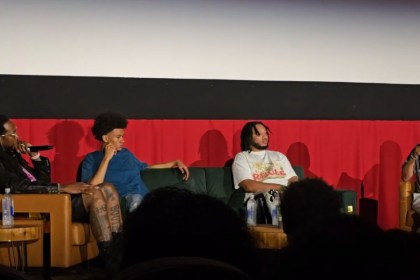
For the past few years, we’ve been hearing accounts of the Lost Boys, thousands of Sudanese boys orphaned during the civil war, which claimed the lives of 2.5 million. We haven’t heard much about the orphaned girls until recently. In the film The Good Lie, written by Margaret Nagle and starring Reese Witherspoon, alongside Sudanese actors Arnold Oceng (Mamere) and newcomer Kouth Wiel (Abital), we’re privy to more.
The Lost Boys traveled from Sudan to Kenya, thousands of miles away, to escape the genocide. Fifteen years later, 3,600 boys and girls were brought to America through a humanitarian effort where they are allowed to resettle, be educated and start new lives in America – the largest relief effort of this kind in U.S. history.
The The Good Lie is a powerful film that brings this tragedy-to-triumph story to screen by depicting the faith, sacrifice and good will displayed during this crisis, which lasted from 1983-2005.
Playing Carrie Davis, an employment agency counselor, Academy Award-winning actress Reese Witherspoon shares, “I was immediately pulled in by the story of the Lost Boys, just seeing their struggle and how they fought to survive. The script really offered a perspective of those two worlds meeting.”
Once they are chosen in the lottery, Mamere and his tribal brothers Paul (Emmanual Jal) and Jeremiah (Ger Duany) are selected to come to America to live in Kansas City and Abital, because she’s female, is sent to live with a family in Boston.
Art Imitates Reality
Oceng shared during a recent interview with rolling out, “Some scenes were so emotional, I had to sit there for a awhile to take them all in.”
Born to a Ugandan mother and Sudanese father, who died when he was two, Oceng and his sister were reared in the UK by their widowed mother who fled the war torn country and settled in Brixton, where he heard very little about the Lost Boys.
Oceng, also a rapper, earned his curious nickname Snakeyman after he lost his front teeth as a kid. He was left with his fangs, which left him with a lisp, a sound very similar to the hissing of a snake.
Wiel’s story reads a little different than her co-star. She was born in 1988 in a refugee camp to Sudanese parents who left Sudan for Itang, Ethiopia. Her parents worked for the United Nations and the World Food Program. Her father was later killed in the Sudan war (1993). Her family immigrated to the U.S. in 1998 where Wiel eventually graduated high school in Minneapolis, Minnesota.
In an interview at the Ritz-Carlton Buckhead in Atlanta, she shares her personal account. “I had a brother, a Lost Boy who immigrated to Kenya and found his way to Minnesota. We were in Ethiopia at the time. He found us through a refugee camp. My mother didn’t even know he was alive and I met him for the first time. In 2009, he went back to Sudan and was killed. We still don’t know what really happened.
“It was hard for me to do this film. I had a lot of anger built up. In 2011, when we celebrated our country’s independence [South Sudan was incorporated] I was still angry because of all that was taken from me.”
How did she stay strong during filming?
“I dedicated it to him and all the people who lost their lives because of this war. I had to step outside of myself and tell the world our story.”
Now ambassadors for The Good Lie film and fund, Oceng and Wiel encourage moviegoers to donate to the humanitarian aid for education.
The Good Lie will be in theaters on October 3.










